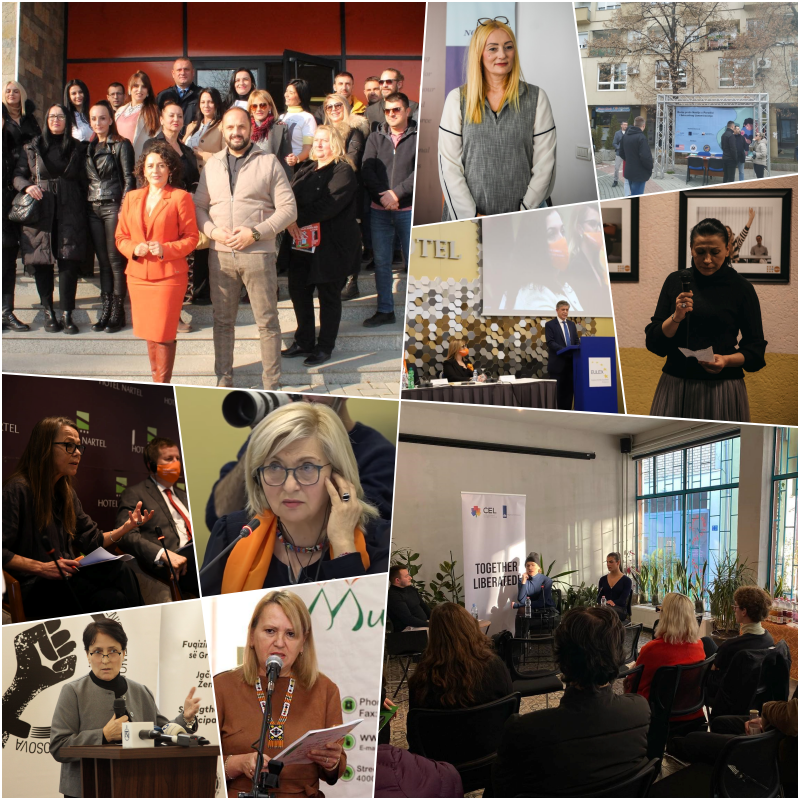Category: Blog Organizations: Kosova Women's Network , UN Women , EULEX , Center for Equality and Liberty (CEL) , Municipality of North Mitrovica , NGO Mundesia Tags:
The global campaign "16 days of activism against violence against women" does not only remind us that women in our environment and around the world suffer violence. This global campaign reminds us of another fact - it is a series of obstacles that women face in the fight for their rights.
The campaign lasts until December 10. We talked to civil activists, women's rights activists, representatives of organizations, followed different events during this week. One thing is for sure, the awareness of the prevalence of violence against women, but also of gender-based violence, is growing. However, there are a number of steps that still need to be taken. All interlocutors agree - women's empowerment is the first and most important step in preventing violence and reducing its consequences.
Statistics
In the first half of the year alone, over 1,300 cases of gender-based violence were reported in Kosovo. However, it is estimated that only 2% of women in Kosovo report cases to the police.
On the other hand, the number of cases of domestic violence is growing from year to year. The number of cases in 2014 was 1,179, in 2019 - 1,915, and in the last year - over 2,000. The majority of victims are women.
Shelters for victims of violence are operational in Gjakova, Ferizaj, Pristina, Peja, Gjilan, Prizren, South Mitrovica, Novo Brdo, and more recently in the northern part of Kosovo.
According to the Kosovo police's response for www.kosovotrustbuilding.com, 56 cases of domestic violence were reported in northern Kosovo from January to November this year. The largest number of cases in the municipality of North Mitrovica - 32.
Regional safe house
"The non-existence of the Safe House was a major shortcoming in the prevention of domestic violence, as civil society has been talking about for years," said Adrijana Hodzic, deputy mayor of North Mitrovica, in an interview with www.kosovotrustubuilding.com. She was the main initiator of building a safe house for the region of northern Kosovo.
With over $150,000, UNMIK financed the adaptation and equipping of the facility, the purchase of furniture, but also equipment that would help the economic empowerment of women who are in the safe house - machines for working in a greenhouse, a laboratory for essential oils.
On the International Day for the Elimination of Violence in Support of Women and Victims of Violence, the entrance to the building of the municipality of North Mitrovica was painted orange.
A meeting of the Coordination Mechanism for the Protection of Women from Domestic Violence and Gender-Based Violence was also held.
"The aim of the meeting was to make a summary and analysis of the situation, all the challenges we face in our work, with the aim of improving existing mechanisms to better protect women victims of domestic violence and, of course, to find a lasting solution" - explains Hodžić.
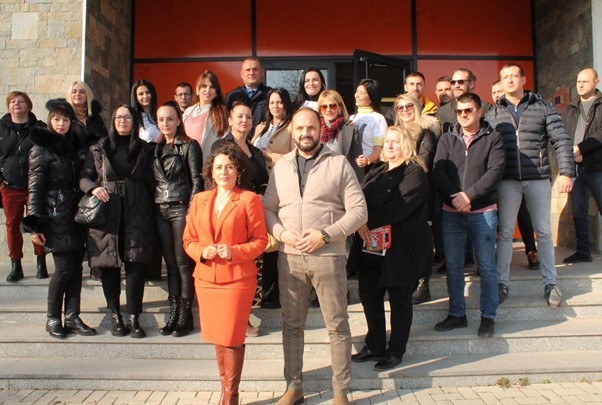
Photo: Municipality of North Mitrovica
Mayor Milan Radojević and Hodžić participated in the activities within which a stand was organized on the Mitrovica promenade, where the deputy mayor talked to the citizens and emphasized the importance of joint involvement in the fight against violence against women. The number of the regional safe house was also promoted.
The telephone number of the Regional Safe House, available 24 hours a day - is 028 478 388.
"A regional safe house based in Zubin Potok can be a lifeline for someone," Hodžić added, recalling that cases of domestic violence and gender-based violence, unfortunately, are often particularly brutal.
Hodžić is committed to helping the victims. She is persistent in the fact that work in cases of domestic violence should be done on two tracks. This is exactly the way of work that experts emphasize.
"All women victims of domestic violence should report the violence immediately, because the sooner violence is reported and experts are involved, the greater the chance that one marital union will be preserved by working with women and men at the same time," she explains.
On the other hand, she advocates for the responsibility of decision makers
"All that is needed for the violence to continue is that responsible people are not up to the task, and it is my moral, as well as official, professional responsibility to be up to the task and I plan to do that," she added.
"We appeal to all victims of domestic violence to report violence, because women have a place and they have someone to deal with it. A safe house is a place where they can calm their thoughts and plan their life in the future," she said.
Part of the promotional activities was held in Zubin Potok - municipality that also contributed to the construction of a regional Safe House in northern Kosovo. It should be reminded that the municipality provided a plot of 15 acres for the Safe House facility.
The deputy mayor of Zubin Potok, Latinka Utvić, points out for www.kosovotrustbuilding.com that "women are not alone".
"We have all the possibilities to adequately take care of the victims of violence in the Regional Safe House," she added, but with the wish that this shelter has as few users as possible.
Her message, she says, is "Don't suffer violence, report it. The local self-government in Zubin Potok is always there to meet the needs of women."
"Invisible" violence - gaslighting and psychological abuse as an element of domestic violence
Physical injuries are only part of what victims of violence suffer. Perpetrators of violence have different ways to control their victim. One of them is gaslighting.
This year, the NGO Žensko pravo is focused on this type of abuse.
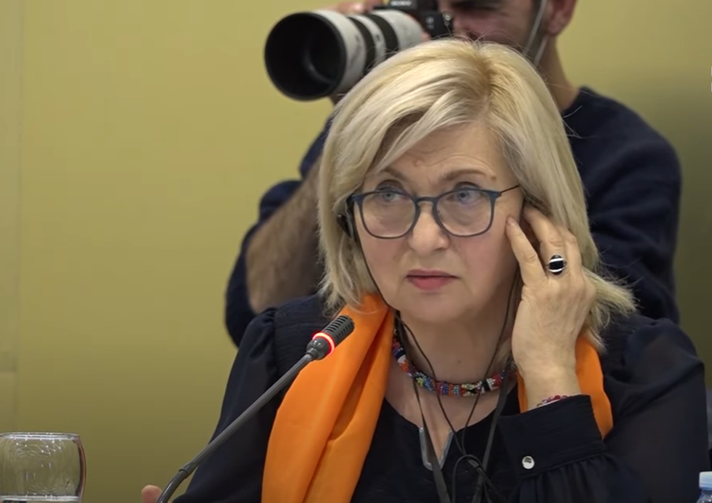
Photo: Youtubeprintscreen
"This type of manipulation can be experienced not only by a partner, but also at school, at work. It is a kind of degradation of personality, self-confidence, in a perfidious and subtle way, and when self-confidence is destroyed, then a person is more inclined to manipulations, loses its identity, and that leads to some other forms of violence and disease," explains in a interview for www.kosovotrustbudiling.com the director of Žensko pravo, Ružica Simić.
The longtime fighter for human and women's rights also had direct contact with victims of gender-based and domestic violence. From her own experience, she explains that people who suffer from gaslighting often become hypersensitive, while it can happen that the environment does not support them:
"I see this in the victims when they come out of such relationships, people from their environment characterize them as problematic people, sick... In fact, the victim needs support, understanding, so she can regain herself, regain her personality and self-confidence and move on."
The topic of gaslighting was also the focus of the conference in which Žensko pravo participated, which was organized in cooperation with EULEX.
It was pointed out that the consequences of psychological violence last the longest.
The victim of violence, Milica Ristović, also pointed to that, but also to secondary victimization.
"Secondary victimization had a much greater impact, where I did not find an understanding of the institutions," she said, praising the support of EULEX, the Kosovo Police, and Žensko pravo.
"Our message is solidarity, empathy and feminism. Feminism is nothing but a simple struggle or constant concern that our rights are not violated and, in this case, psychological violence - not to allow other people, close people, partner, relatives to degrade us in this way and put us in a position to doubt our own dignity and self-confidence" - said Simić for www.kosovotrustbuilding.com.
Trans Women are Women!
The attention of the public and the institution should be especially focused on the marginalized and most vulnerable groups of girls and women. Among them are trans women.
Aiming for a brighter future free of violence against women and girls, Centre for Equality and Liberty (CEL Kosova) organised a panel discussion attempting to raise awareness, promote advocacy efforts and exchange knowledge about trans women.
The panel had a special focus on transgender women’s socio-economic rights, civil rights, safety and health. The panel discussion was composed of trans women, who highlighted physical, psychological and sexual violence against trans women in Kosovo, access to medical services, including hormone therapy procedures and surgeries, opportunities in employment and education, access to various institutions and actors in the country, and acceptance by Kosovo society.
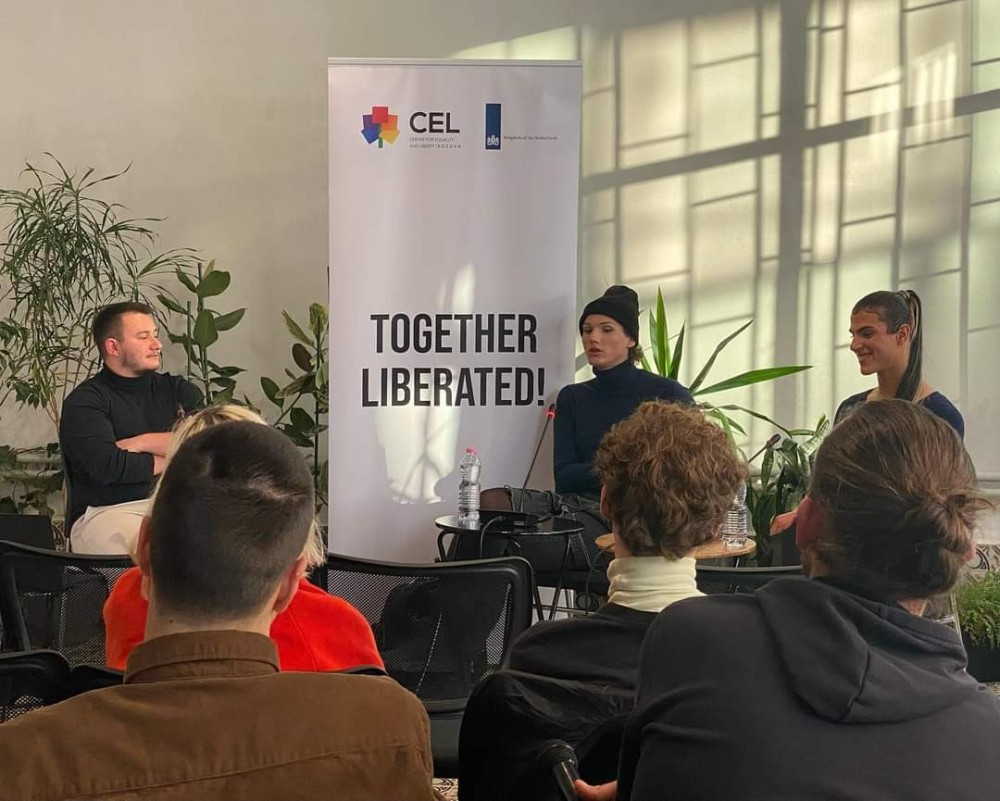
Photo:CEL Kosova
"Regardless of the recent progress in the transgender movement in Kosovo, which has resulted in greater public awareness and significant legal victories, trans women in particular continue to face flagrant discrimination, high levels of violence, and a health system that does not fit the needs of transgender people" - points out Cel in a statement for www.kosovotrustbuilding.com.
CEL Kosova’s message is that everyone should understand that: "Trans Women are Women! Let us not forget such a thing, and become an ally of this vulnerable community by becoming their voice for equal rights and freedoms!"
Property and women ...
Economic empowerment and gender equality are basic preconditions for creating a society where girls and women feel safe and empowered.
Women own 17% of total property in Kosovo, only 7% of women inherit property, while it is not known how many women and girls in Kosovo choose to renounce the right to inherit property for the benefit of their male family members.
And the lack of access to property rights promotes a culture of vulnerability.
Without their own property, victims of violence may find themselves with no alternative but to remain in relationships where they suffer violence and abuse.
The conference dealing with this topic launched a project and a five-month campaign on property rights and domestic violence, with the support of EULEX in Kosovo and the implementation of the Leadership and Diplomacy Forum led by the Emini sisters.
EULEX chief Ambassador Lars-Gunnar Wigemark said victims of domestic violence needed long-term public support to break free from the vicious circle of economic and financial dependence on th perpetrators of violence:
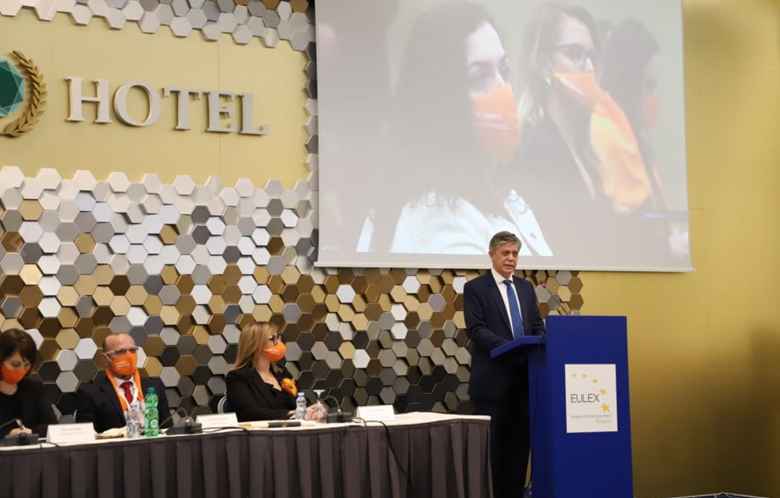
Photo: EULEX
"If you have no income of your own, you may even decide to tolerate the intolerable and stay in the abusive relationship. Shelters and other temporary homes for victims of domestic violence offer temporary protection and support. They are welcome and necessary. But shelters are not a permanent solution."
"This kind of independence will help them get rid of violent relationships," said Njomza Emini at the event.
Economic empowerment and daily support
"Women are fighters, follow them!" - is the motto of the Mitrovica Women's Association for Human Rights (MWAHR).
This organization is recognized for its work in the field, directly with users, including those from vulnerable social groups. In addition, it brings together women from different communities. Empowering women and girls is seen as one of the best ways to change their position in the society.
The executive director of this organization, Vetone Veliu, told www.kosovotrustbuilding.com that the association she leads has a series of activities during the 16 days of activism, which are carried out together with the Gender Equality Officer and other actors involved in women's protection.
They focus, among other things, is on peace. Thus, in addition to debates, lectures, they also organize a several-day-long seminar in partnership with Peščanik on women, security, peace and UN Council Resolution 1325.
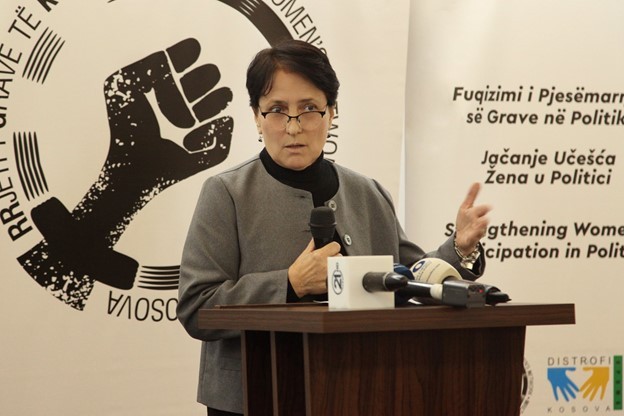
Photo: KWN
Veliu has also been recognized by the public as a longtime civic activist. Her message is therefore clear, short and in line with the association's motto:
"Be your own and fight for yourself!"
The inclusion of women in the economy and society through production and service programs was the initial goal of the NGO Lady/CC4WOMEN led by Sanija Murati.
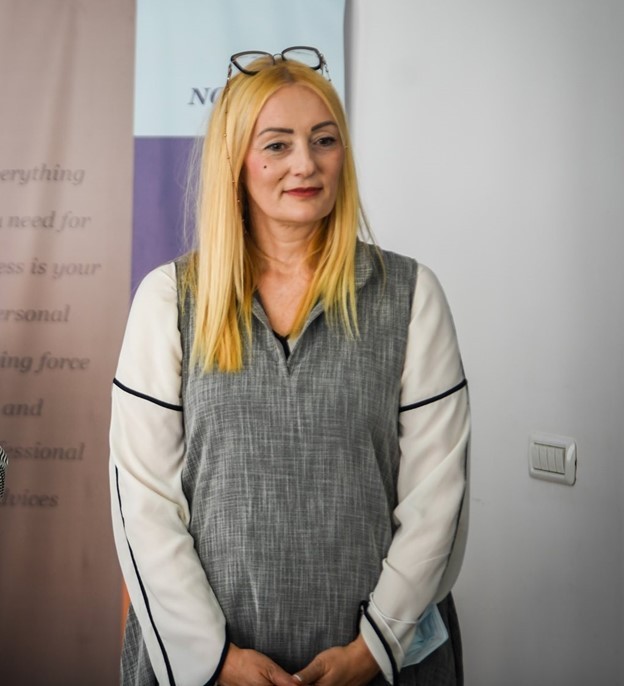
Photo: Municipality of Podujevo
She founded the organization in 2005, and their activities have not stopped until today.
In public, Sanija is known for her social engagement and energy for gathering women and girls, but also for providing support to them. Through activities for 16 days of activism, this organization pointed out the importance of support among women, raising awareness of the need for psycho-social support. There were also daily activities, i.e., daily individual meetings and consultations with women who need support to get out of current situations.
"The doors of NGO Lady/CC4WOMEN are wide open to all women in Kosovo. We have helped many! Do not hesitate to knock on our door and fight for the life you deserve! You are not alone!" - said Sanija Murati for www.kosovotrustbuilding.com.
NGO Mundësia also works directly with women. Economic empowerment, initiatives to raise women's awareness of the importance of caring for their own health are part of their activities.
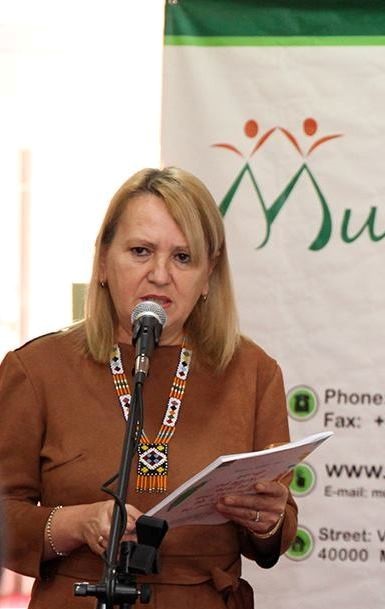
Photo: NGO Mundësia
This year, for the sixth time in a row, Mundësia will organize the "Cycling Against Violence" activity, and this time on December 8, paragliders will also carry a message against violence, children will also take part, handing out orange bracelets they made to passers-by.
"Violence should not be hidden or tolerated, it is a weapon of the weak ones. Women and girls who face the waves of life strongly, make their voices heard, work hard and finally triumph. TO STOP VIOLENCE TOGETHER! ” - said Hasime Tahiri Hasani from the NGO Mundësia in an interview for www.kosovotrustbuilding.com.
Legal issues
Despite the support, a large number of women still face a number of obstacles in order to achieve their rights. Women are especially vulnerable to violence. Some of these obstacles are of a legal nature.
That is why, with the support of UN Women and the European Union, an online platform for free legal aid was officially launched as part of the 16 Days of Activism campaign.
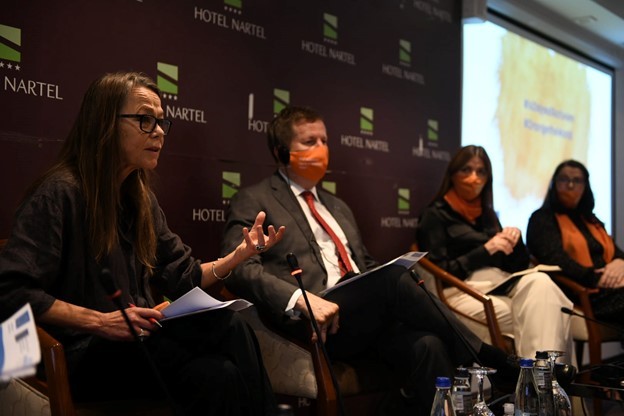
Photo: EU office in Kosovo
The Legal Aid Center platform should facilitate access to free legal aid (and total access to justice) for women victims of gender-based violence and domestic violence, with a focus on women from marginalized communities, women with disabilities, and women from rural areas.
The Mobile Legal Clinic was available to citizens on December 2nd in North Mitrovica, as part of a project by the Center for Cultural Advocacy and the Center for Legal Aid and Regional Development.
"The goal is to raise citizens' awareness of domestic violence and gender-based violence, to point out the mechanisms that exist in solving this problem," explained Slobodan Stošić from the Center for Cultural Advocacy for www.kosovotrustbuilding.com, stating that attended representatives of the Prosecutor's Office, legal aid, as well as representatives of the social services of the Department for Domestic Violence, Protector of Citizens at the Prosecutor's Office in Mitrovica attended also.
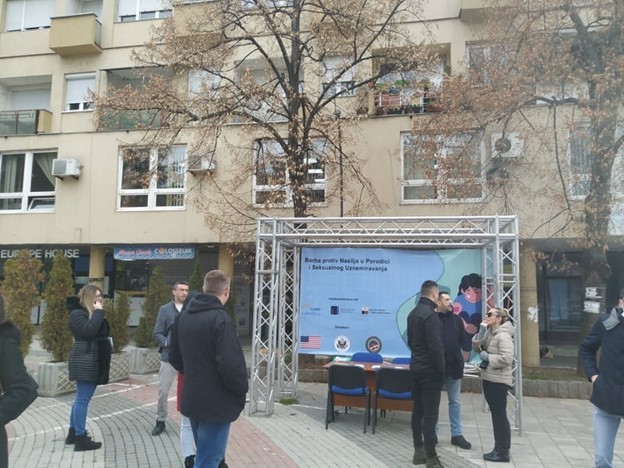
Photo: Kosovo TrustBuilding Platform
"In this way, we also wanted to point out the institutions to which victims can turn, and these are, among others, CLARD and the Kosovo Institute of Justice, which provide free legal aid to victims of domestic violence and sexual harassment. We also wanted to show that the victims are protected by law and that they can be helped, but also to point out that this is their right," he added.
"Altered Reality" - Invisible Violence
The changed reality is how the reality of the victims of violence in public could be described in relation to the one they experience in themselves, in their homes.
The exhibition "Invisible Violence" by Milan Dobrić indicates just that - behind smiling faces, calm eyes, often hides what we can't even guess. The exhibition was organized in cooperation with the United Nations Population Fund in Kosovo (UNFPA), as part of the Fourth Festival of Women's Creativity - FEŽES.
"Milan Dobrić came up with the idea of using technology called 'augmented reality' and he suggested to our organization that we use it for one of the campaigns, given that the Population Fund deals with women's health and everything related to health of woman. We came up with the idea to use it to raise awareness about gender-based violence," said Nadica Djordjevic from UNFPA in an interview with www.kosovotrustbuilding.com.
As she explains, the idea was that the audience could first see beautiful and pleasant photos - what the victims of violence would like their environment to see, so that through the augmented reality application they could then see what is hidden and what are they dealing with.
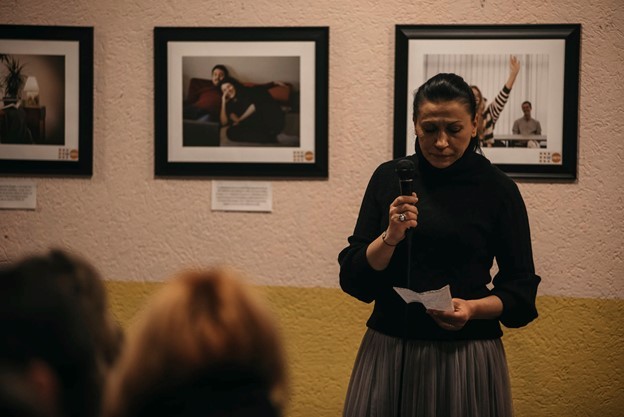
Photo: Milan Kabašić
This exhibition is just one in a series of UNFPA activities. Training for health workers on recognizing and documenting violence against women was also organized.
Djordjević believes that violence against women is not talked about enough in public, and not in the right way:
"Not enough is being done on that issue, the approach to the victims is still not how it should be. We are still facing institutional problems because of which they do not dare to get out of violent partnerships. As their fellow citizens, neighbors, friends, we should strengthen our own level of empathy. We should all work to do at least something for others."

